News & Media
Reflecting on 68 years of women's progress
On Thursday 15 August 2024, the University of South Africa (Unisa) and the South African Women in Dialogue (SAWID) convened their Annual Women’s Month Dialogue, centred around the theme "Women, Democracy and Leadership in the South African Government of National Unity". The event offered a touching reflection on the progress and challenges facing South African women in the context of the nation’s evolving political landscape.
SAWID is an independent South African Women's platform committed to hearing the voice of every woman and to improving the status of women by engaging national government, the private sector, civil society, (including non-governmental organisations, community-based organisations, faith-based organisations and donors) in partnership to shape community, provincial and continental agendas.
This year's dialogue was particularly notable as it marked the 68th anniversary of Women’s Month, commemorating the historic 1956 march when over 20 000 women marched to the Union Buildings to protest apartheid’s pass laws. This anniversary served as a powerful reminder of the courage and resilience of South African women who fought for their rights and laid the foundation for future generations.
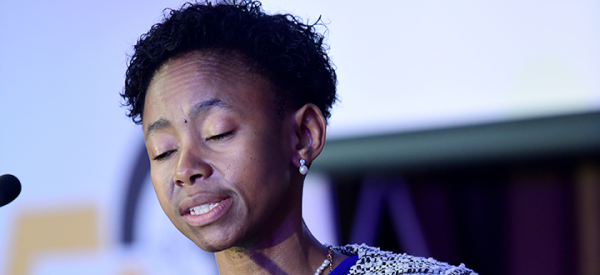
Unisa Vice-Principal: Information and Communication Technology, Mathabo Nakene-Mginqi
In her welcoming address, Unisa Vice-Principal: Information and Communication Technology, Mathabo Nakene-Mginqi, said: "The University of South Africa recognises the importance of National Women’s Day as the platform to honour the legacy of these courageous women and to promote continuous efforts towards gender equality within the academic community and beyond. Unisa aims to educate and raise awareness about the historical and contemporary significance of National Women’s Day. To promote gender equality and empowerment initiatives within the university and the broader society, we foster a supportive and inclusive environment for women at this university. By commemorating National Women’s Day, Unisa reaffirms its commitment to upholding the values of equality, justice and human dignity inspired by the courageous women who have shaped South African history and continues to inspire future generations."
The timing of this dialogue was particularly significant, occurring in the wake of South Africa’s 7th democratic elections, which had resulted in the formation of a Government of National Unity (GNU) following a fiercely contested electoral period. The dialogue explored the implications of these political developments for women’s rights and gender equality, emphasising the need to safeguard and build upon the advancements achieved since the country’s first democratic elections in 1994.
Sindisiwe Chikunga, Minister in the Presidency responsible for Women, Youth and People with Disabilities, opened the discussion by reflecting on the journey of South African women over the past 30 years of democracy. "According to the International Association of Women Judges," she said, "in 1994 there were approximately 165 judges, of which 160 were white men. Of the remaining five, three were black men and two were white women. As of February 2023, there are now 253 judges of which 113 (45 percent) are women. Of the total figure, 17 percent are white men, 39 percent are black men, 13 percent are white women, and 32 percent are black women."
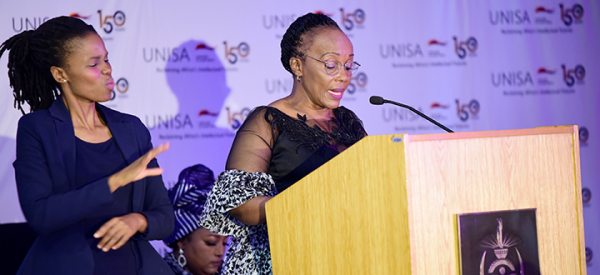
Sindisiwe Chikunga, Minister in the Presidency responsible for Women, Youth and People with Disabilities
Continuing, Chikunga said that women’s representation in parliament has increased from 28 percent in 1994 to 43.5 percent in the current GNU. Chikunga emphasised that these advancements in representation reflect a broader trend towards inclusivity and gender equity in South Africa’s political and judicial systems. "Of the 75 executive members appointed in June 2024, 32 are women representing 42,66 percent. 14 of 32 cabinet positions are held by women and 18 of the 43 deputy minister positions are held by women," she added.
Directed by Criselda Kananda – renowned broadcaster, human rights advocate, and gender activist – the dialogue focused on several key areas:
Progress made by women since 1994 and what the 7th administration (GNU) can do to empower the women of SA today
Discussions centred on the achievements since 1994 and what the GNU can do to further empower South African women. Prof Thuli Madonsela, Director of the Centre for Social Justice, noted that the 1956 marchers’ efforts had led to significant legal reforms. Madonsela said the historic women who marched to the Union Building made it their task to clean out the rules that were discriminating and made it possible for everyone to be equal, Family laws were changed, they changed the laws of maintenance, and they changed the employment equity act. She further emphasised that the GNU could ensure that every law that has been passed anticipates impact on gender equality and that every law does not leave anyone behind.
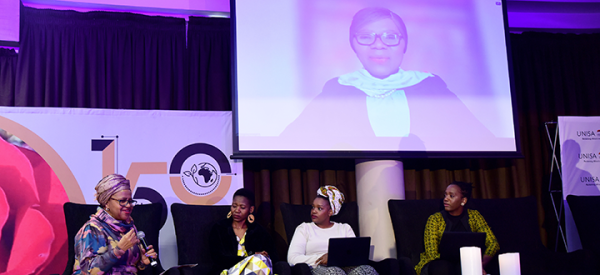
Prof Thuli Madonsela, Director: Centre for Social Justice, Stellenbosch University (virtual attendance, on screen).
From left Moderator, Mmabatho Ramagoshi, Chairperson of the Mmabatho Foundation for Women’s Development; Prof Puleng Segalo, Chief Albert Luthuli Research Chair, Unisa; Nonkululeko Mntambo, Co-Founder: AfroManifesto; and Thando Mntambo, Researcher: AfroManifesto
Chief Allbert Luthuli Research Chair, Prof Puleng Segalo agreed with Madonsela and urged the government to take on some of the recommendations and output that comes from the research that is conducted within the university.
National gender machinery
The dialogue reviewed the successes, gaps and challenges of the national gender machinery, highlighting the importance of effective representation. This review underscored how the introduction of national gender machinery has facilitated the rise of women to prominent positions, including South Africa’s first female Chief Justice, Mandisa Maya, Unisa’s first female Principal and Vice-Chancellor, Prof Puleng LenkaBula, and the first deaf woman crowned Miss South Africa, Mia le Roux. Since then, phenomenal women have made significant progress in breaking barriers and increasing representation for women in various spheres, said Kealeboga Mochawe, representing Unisa’s National Student Representative Council.
The dialogue not only celebrated the resilience and achievements of South African women, but also set a forward-looking agenda for enhancing their role in shaping the nation's future. As South Africa continues to evolve, the discussions underscored the importance of preserving and expanding upon the gains made, ensuring that women's voices and contributions remain central to the country’s democratic and developmental trajectory.
* By Rememberance Manganyi, Journalist Intern, Department of Institutional Advancement
Publish date: 2024-08-22 00:00:00.0


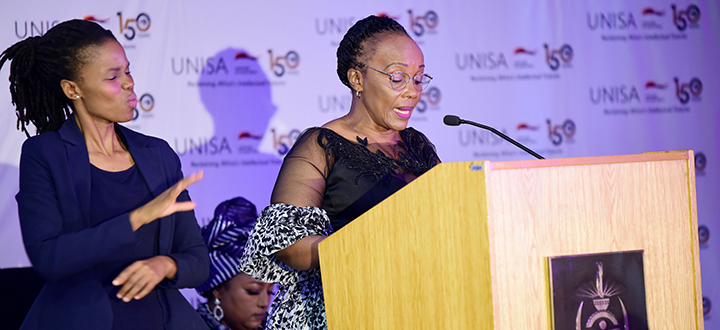 Reflecting on 68 years of women's progress
Reflecting on 68 years of women's progress
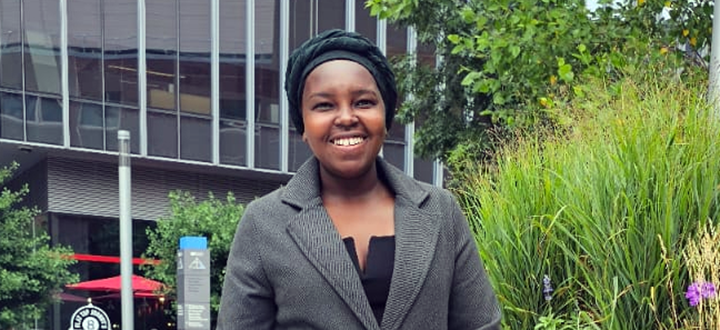 "Designing clean water storage systems is deeply personal to me"
"Designing clean water storage systems is deeply personal to me"
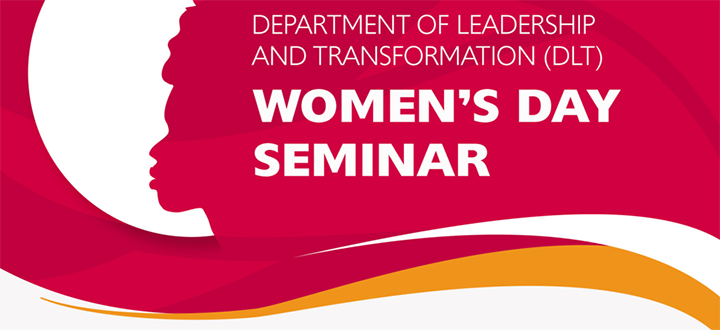 Discourses on black women leadership in the South African academy
Discourses on black women leadership in the South African academy
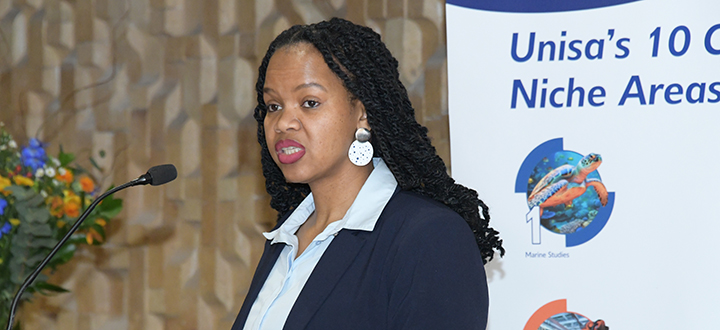 Day two of CNA Research Symposium focuses on aviation, aeronautics and strategic funding
Day two of CNA Research Symposium focuses on aviation, aeronautics and strategic funding
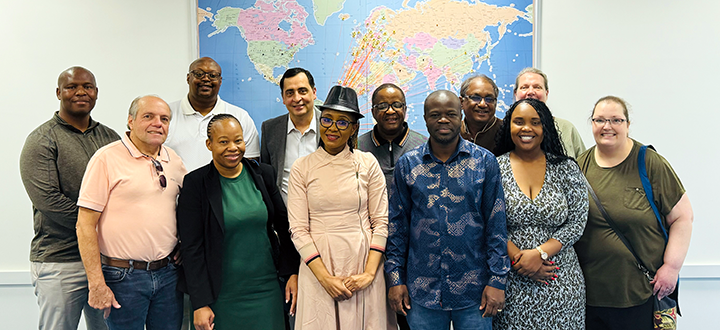 Unisa sets out to strengthen BRICS partnerships with Brazilian universities
Unisa sets out to strengthen BRICS partnerships with Brazilian universities